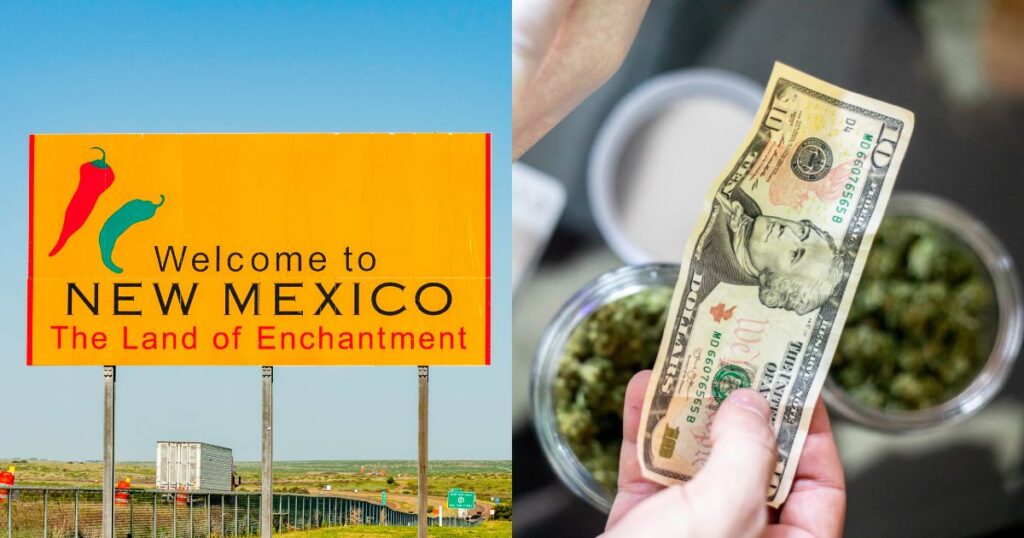Cannabis isn’t just reshaping societal views on recreational substances; it’s now becoming a pivotal financial tool for economic reform and community support. Albuquerque, New Mexico, recently highlighted this potential by launching a pilot program funded by cannabis sales tax revenue. This initiative offers families in underserved communities monthly $750 payments with no strings attached. While this signals an economic experiment, states still holding out on cannabis legalization are missing out on the same opportunities.
Basic Income Pilot Program Being Funded By New Mexico Cannabis Tax Revenue
The basic income pilot in Albuquerque is funded in part by the city’s tax revenue from recreational cannabis sales, as first reported by Business Insider. The program, facilitated by the city’s Cannabis Equity & Community Reinvestment Fund, focuses on redistributing funds to families adversely affected by outdated cannabis laws.
Eighty families from two districts, where academic performance tends to suffer and economic challenges prevail, now receive $750 per month. By prioritizing communities disproportionately targeted by cannabis prohibition policies, Albuquerque is addressing systemic inequities while also exploring new avenues for municipal welfare initiatives.
Guaranteed basic income (GBI) programs like this differ from universal basic income programs by focusing on specific populations rather than the general public. Although criticisms such as “encouraging unemployment” persist, the historical data supporting GBI programs debunks many of these myths. Time and again, such initiatives have been shown to improve participants’ housing stability, mental health, and access to employment opportunities by allowing them more time and resources to pursue long-term goals.
How Cannabis Revenue Fits Into the Bigger Picture
Cannabis taxation has become a rich resource for states with legalized markets. Reportedly, New Mexico’s cannabis industry has contributed millions toward this pilot program. This shows the larger financial potential of cannabis legalization, which, beyond generating funds for regulatory oversight, provides substantial benefits when reinvested into social programs.
By reallocating profits toward programs that uplift low-income and marginalized communities, states like New Mexico reflect a forward-thinking approach to cannabis policy. The cannabis industry, often stigmatized, is emerging as an agent of justice and reform in the U.S. economy.
This raises a question for states still refusing to legalize cannabis or build viable industries around it. The longer prohibition policies prevail, the more these regions lose out on the dual financial and community benefits that cannabis programs have been proving viable.
Cannabis tourism is also influencing state economies, with consumers traveling to neighboring states to access legal products. From California to Illinois and Massachusetts, cannabis-driven revenue is helping fund schools, infrastructure projects, and community development. Conversely, prohibitionist states are seeing the spending leave their borders entirely.
Without local legislation to regulate and benefit from cannabis sales, these states are effectively subsidizing others’ economies. Furthermore, as social equity becomes intertwined with cannabis reform, these states risk missing their chance to harness cannabis funds to address their unique social challenges.
Breaking the Prohibition Mindset
States still clinging to cannabis prohibition fail to see beyond outdated stigmas and framed “vice” taxes. Programs like Albuquerque’s GBI pilot provide a living example of how cannabis-based revenue can achieve meaningful change in a way traditional methods have not.
By leveraging a formerly vilified legal plant to make social amends, cannabis legalization has proven it can bridge the gap between economic efficiency and moral responsibility. From funding healthcare expansions to education reform, the socially restorative potential of cannabis revenue is too significant to ignore.
Albuquerque’s cannabis-funded basic income pilot is an innovative example of how to use emerging industries to drive economic justice. States clinging to prohibition are not just missing out on financial opportunities but failing to partake in a nationwide movement toward ethical economic growth.
The Albuquerque pilot redefines how communities can evolve through thoughtful redistribution and innovative funding. By taking the lessons learned here, more states could explore approaches to elevate their communities using funds derived from adult-use markets. The message is clear – cannabis revenue isn’t just filling coffers; it’s paving the way for a fairer, more equitable society.

















